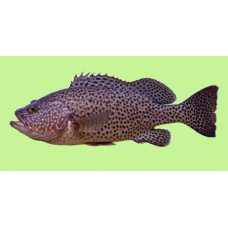Latin name
Epinephelus chlorostigma
Other name
Brown spotted reef cod, brown-spotted rockcod, coral grouper or honeycomb cod.
Identification
The body of the brown spotted grouper is somewhat elongated and covered with ctenoid scales with additional scales. The upper profile of the head is convex. Interorbital space slightly convex. Pronotum with pointed corners and 4-7 enlarged serrations on the corners. Upper margin of gill cover straight. Three spines on gill cover. Subopercular and interopercular bones smooth. Upper jaw perpendicular to posterior margin of eye. There are 2-4 lateral rows of small teeth on the middle part of the lower jaw, the teeth of the inner rows being twice as long as those of the outer rows. There are 8-11 gill stamens on the upper part of the gill arch and 15-18 on the lower part. Lateral line with 48-53 scales. Pyloric appendages 26-52.
Features of fish fins
Long dorsal fin with 11 hard barbs and 16-18 soft rays; third or fourth hard ray longest. Anal fin rounded or pointed with 3 hard and 8 soft rays; third barb longer than second. Pectoral fins with 17-19 soft rays, slightly longer than pelvic fins. Caudal fin truncate or slightly convex.
Fish colouring
The body, head and fins of the brownspotted grouper are pale greenish grey, covered with small irregularly distributed dark brown spots. Caudal fin with a white stripe along the posterior margin. The spots on the pectoral fins are along the rays.
Distribution
Widespread in the Indo-Pacific from the Red Sea along the east coast of Africa to southern Japan, Papua New Guinea, the Caroline Islands, New Caledonia, Australia and Fiji.
Habitat
Benthic marine fishes. They live near rocky and coral reefs and on muddy bottoms at depths of 4 to 300 metres.
Size
The maximum length of fish of this species is 80 cm, usually up to 50 cm; the mass - up to 7 kg. The height of the body is less than the length of the head, stacked 2.8-3.3 times the standard body length (for individuals from 12 to 51 cm long). The length of the large head is 2.4-2.7 times smaller than the standard body length.
Behavior
It is a solitary species. Adults form spawning aggregations.
Food and feeding habits
They feed mainly on fish and crustaceans (crabs and rotifers).
Reproduction
Protogynous hermaphrodites. Females mature at a length of 23 to 29 cm. Sex change occurs at a length of 35 to 45 cm, but not all females change sex. Maximum lifespan is 29 years.
Fishing
Commercial fishing takes place in the waters of Singapore and Hong Kong. Longlines, traps and bottom trawls are used.
Relationship with a person
A species of fish harmless to humans.
| Classification | |
| Phylum | Chordata |
| Class | Actinopterygii |
| Squad | Perciformes |
| Family | Serranidae |
| Genus | Epinephelus |
| Species | E. chlorostigma |
| Features | |
| Conservation status | Least Concern |
| Habitat | Pelagic |
| Life span, years | 29 |
| Maximum body weight, kg | 7 |
| Maximum length, cm | 80 |
| Sailing speed, m/s | No information |
| Threat to people | Edible |
| Way of eating | Predator |
Brownspotted grouper
Tags: brownspotted grouper

